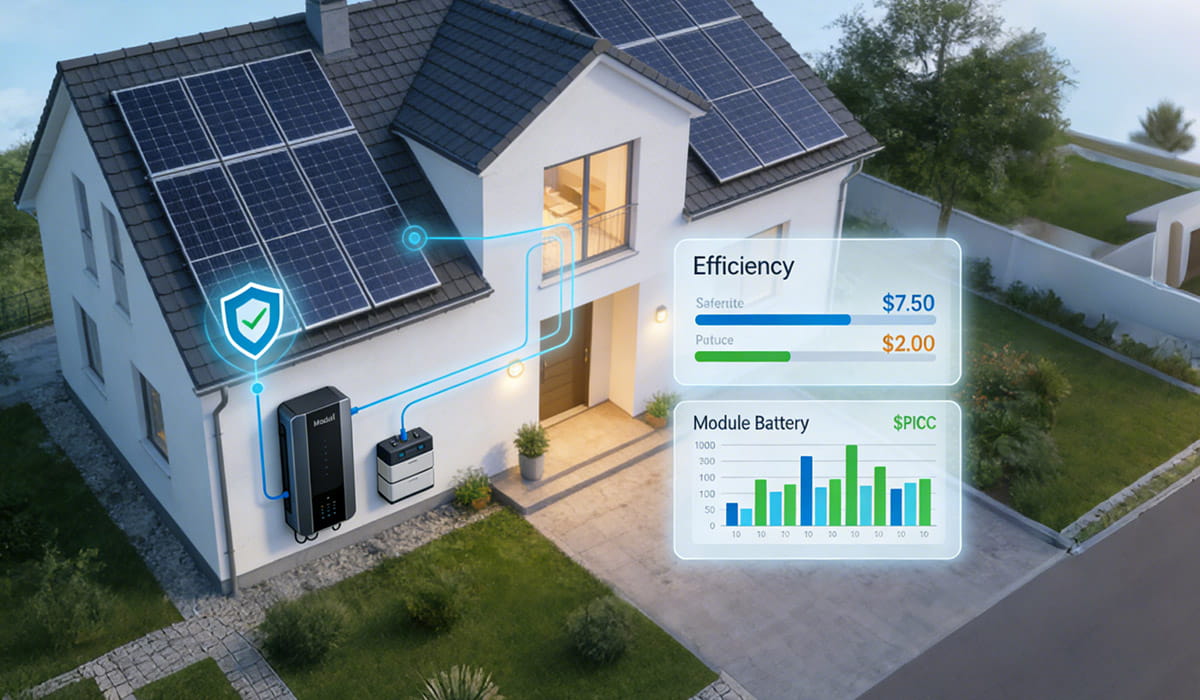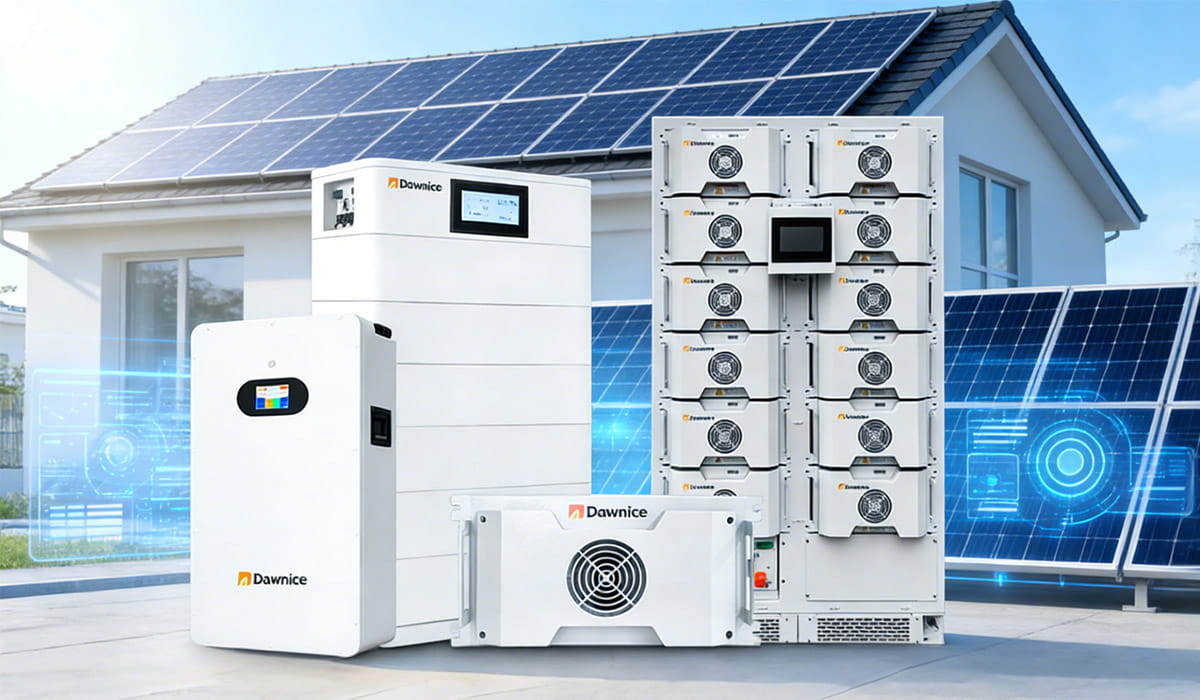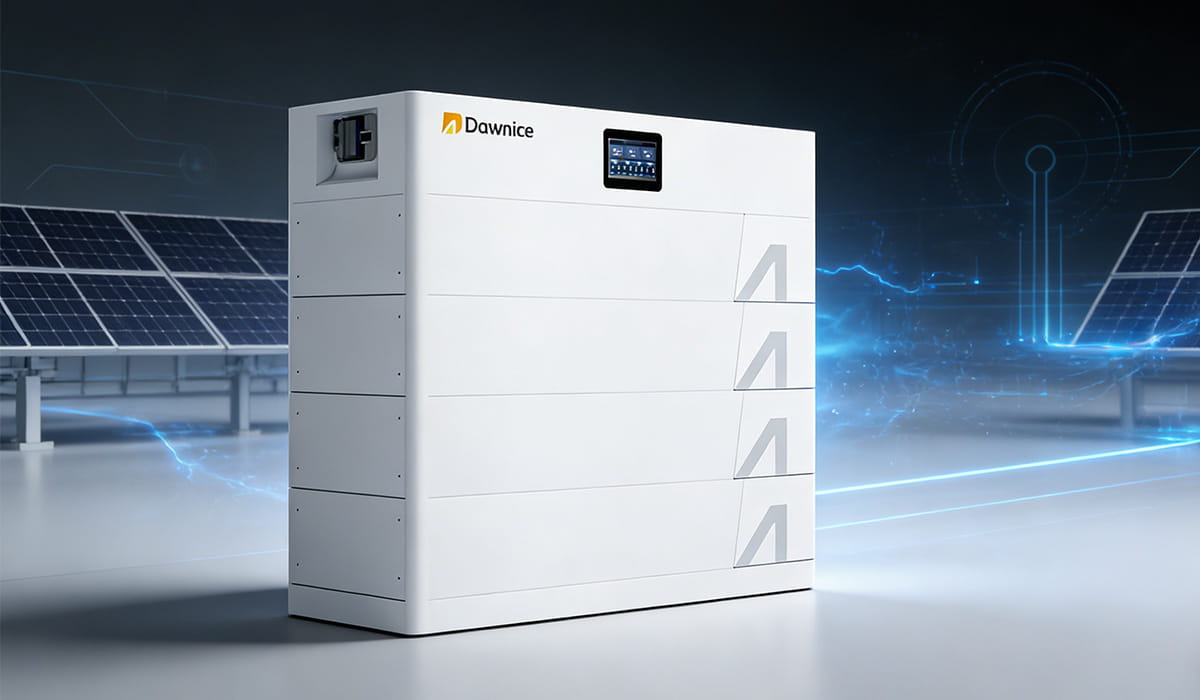Blog
Blog
How to Choose from 5 Types of Solar Batteries – Ultimate Guide
Published by Dawnice, October 23, 2025
Are you thinking about using solar energy but unsure which battery type fits your needs? Whether you’re powering a home, a business, or an off-grid project, picking the right solar battery can feel overwhelming. But don’t worry — I’m here to help you make sense of it all.
In this guide, we’ll break down the basics of solar batteries, explore their real-world uses, compare the five main types available today, and share practical tips to help you choose wisely. Let’s dive in!
What Are Solar Batteries?
Solar batteries are devices that store energy generated by solar panels. Think of them as a “power bank” for your solar system — they save electricity produced during sunny hours so you can use it at night or on cloudy days.
Solar panels capture sunlight and convert it into electricity. Without a battery, any extra power not used immediately goes to waste (or back to the grid, if you’re connected). But with a solar battery, that energy is stored for later. It’s like filling a water tank during the rain to use when it’s dry.
Most solar batteries work with a solar charge controller, which regulates voltage and current to prevent overcharging or damage. Whether you’re looking for solar energy battery storage for your house or a small battery for solar power storage, understanding this basic idea is the first step toward energy independence.
What Are the Applications of Solar Batteries?
Solar batteries aren’t just for one type of user — they’re used everywhere energy reliability matters. Here’s how different people benefit from them:
Residential Energy Storage
More homeowners are installing solar batteries for solar panels to cut electricity bills and gain backup power during outages.
Off-Grid Solar Systems
If you live in a remote area or enjoy RV life, batteries for off grid solar let you live comfortably without being tied to the electrical grid.
Commercial & Industrial Uses
From factories to farms, businesses rely on solar storage batteries to reduce peak demand charges and keep operations running.
Solar Lighting & Small Devices
Nickel cadmium battery for solar lights and rechargeable solar batteries are popular for garden lights, security systems, and portable gadgets.
Emergency Power Backup
Hospitals, data centers, and telecom stations depend on high quality solar battery systems to maintain uptime during blackouts.
No matter your goal — saving money, going green, or securing power — there’s a solar battery designed for your needs.
Types of Solar Batteries: Which One Is Right for You?
Not all solar batteries are created equal. To help you compare, let’s look at the five most common types of solar batteries used today.
? Lead Acid Batteries
A classic choice, lead acid batteries are affordable and reliable. They come in two main forms:
- Flooded Lead Acid Battery: These require regular maintenance (like adding water) but are cost-effective and durable. Often used in solar power battery setups where budget is key.
- Sealed Gel Battery: Maintenance-free and leak-proof, these are safer and work well in small solar systems or indoor installations.
Best for: Beginners or users with limited budgets.
⚡ LiFePO4 Batteries
Lithium iron phosphate (LiFePO4) batteries are known for safety and long life. They handle deep discharges well and perform reliably in varying temperatures.
Best for: Home energy storage, RVs, and anyone wanting a maintenance-free best solar battery.
? Lithium-Ion Batteries
Popular in electronics and EVs, lithium ion battery for solar panel systems offer high efficiency and compact size. They’re lightweight and have a high energy density.
Best for: Residential and commercial systems where space and efficiency are important.
? Nickel Cadmium Batteries
Though less common today, nicad battery units are tough. They perform well in extreme temperatures and have a long cycle life.
Best for: Industrial or off-grid applications where durability is critical.
? Flow Batteries
These are the newcomers. Flow batteries store energy in liquid electrolytes and are highly scalable with very long lifespan.
Best for: Large-scale solar energy storage like community grids or industrial complexes.
? Solar Battery Comparison Table
| Battery Type | Lifespan (Cycles) | Efficiency | Cost | Maintenance | Best Use Case |
|---|---|---|---|---|---|
| Lead Acid | 500–1,000 | 80–85% | $ | Medium | Budget systems, backup |
| LiFePO4 | 2,000–5,000 | 95–98% | $$$ | Low | Home storage, daily use |
| Lithium-Ion | 1,500–3,000 | 90–95% | $$$ | Low | Residential/small commercial |
| Nickel Cadmium | 1,000–2,000 | 70–80% | $$ | Low | Extreme weather, industrial |
| Flow Battery | 10,000+ | 75–85% | $$$$ | Medium | Large-scale energy storage |
Tips for Choosing Solar Battery Types
With so many solar battery options, how do you pick the best one? Here’s a simple step-by-step approach:
- Know Your Energy Needs: Start by calculating how much power you use daily. This will help determine the best battery for solar panel systems in terms of capacity.
- Set a Realistic Budget: Cheap solar power batteries might save you upfront, but long-term value matters. LiFePO4 may cost more initially but lasts longer.
- Consider Space & Installation: Lithium batteries for solar panels are compact and lightweight — great for tight spaces. Lead acid batteries are larger and need ventilation.
- Compare Battery Life & Warranty: Check cycle life and product warranty. Best solar batteries often come with 10-year coverage.
- Evaluate Safety & Maintenance: Sealed and lithium options like lithium battery for solar system are safer and easier to maintain.
- Plan for the Future: If you might expand your system, choose scalable tech like solar lithium ion batteries.
- Read Reviews & Get Expert Advice: Look for real-world feedback or consult a professional — especially if you’re searching for an ionic battery dealer near me.
By answering these questions, you’ll be well on your way to selecting a battery that fits your lifestyle and energy goals.
Final Thoughts
Choosing the right solar battery doesn’t have to be complicated. By understanding the different solar battery types, how they’re used, and what to look for, you’re already ahead of the game.
The best battery for solar power is one that matches your energy needs, budget, and long-term plans. Whether you go with trusted lead acid, modern LiFePO4, or high-tech flow batteries, you’re making a smart move toward cleaner, more reliable energy.
Ready to take the next step? Use this guide to compare solar batteries for solar panels and find your perfect match.






